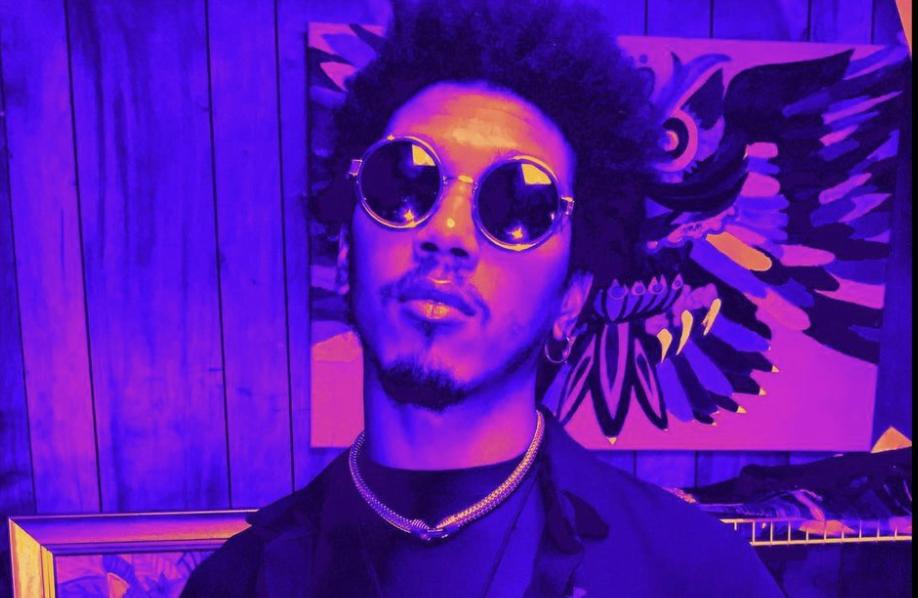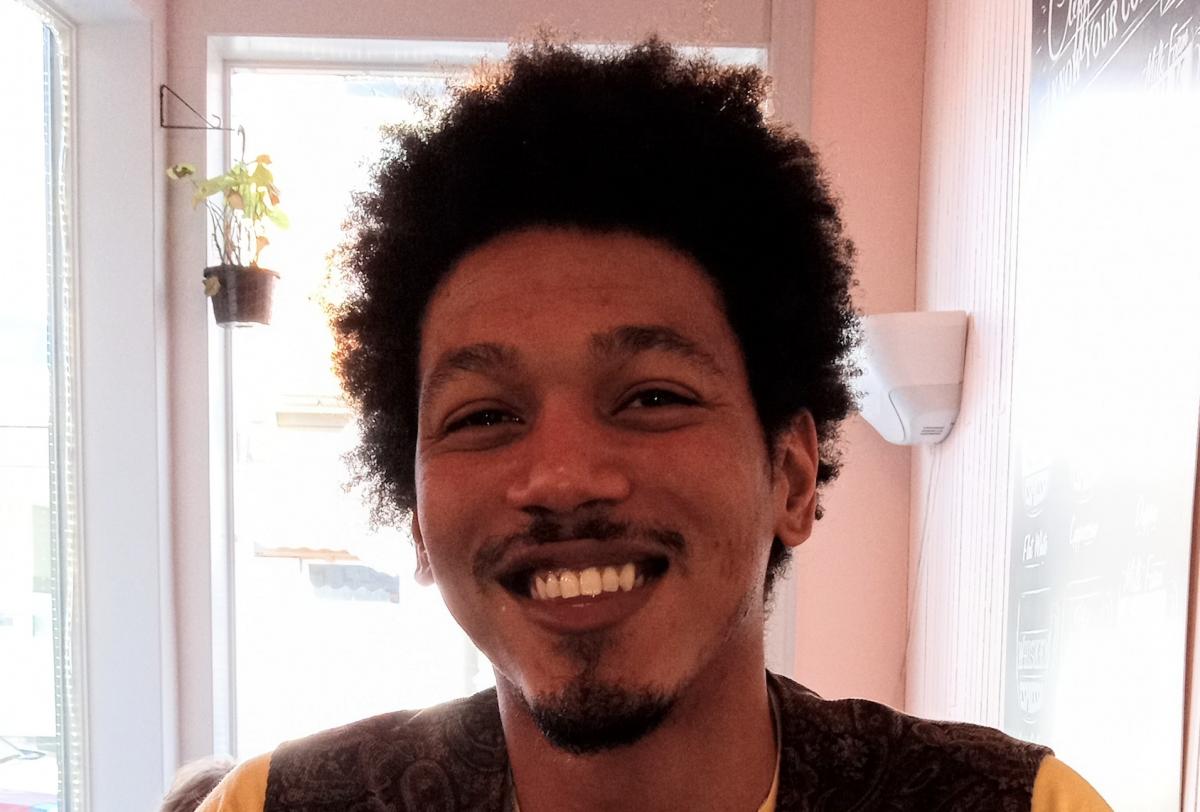Marco Antonio Garcia never set out to become an innovator on local airwaves. But after nearly 10 years of asking the intriguing question, ‘Who’s DORiS?’ it’s clear he’s more than answered, carving out a creative interview and music space that resonates with listeners, first in Salisbury, now on his hometown station, 101.5 FM, WHCP, Cambridge Community Radio.
Garcia describes his DORiS Media enterprise as “a multi-medium production company dedicated to bridging the gaps in the community through the arts.” But ‘the arts’ is just a part of his wide reaching focus, featuring laid-back but revealing interviews with an array of grass roots community champions, doers and dreamers, making a difference.
His initial foray into radio was “something of a whim” while an anthropology/political science undergraduate Salisbury University, Garcia recalled.
Through the TRIO program, designed to facilitate higher education opportunities for students who would be the first generation in their family to go to college, the 2012 graduate of Cambridge South Dorchester High School attended Chesapeake College before transferring to Salisbury U., participating in leadership and communuty outreach travel programs which expanded his horizons, teaching him not only about how organizations work but also putting lhim further down the road to getting to know “people different from me and finding common ground,” he recalled.
Prior to pitching a radio show as a semester long project reflecting the campus and community, Garcia hadn’t even been aware of Salisbury’s student run station WSXU, 96.3 FM.
“I wanted to do interviews essentially as research, sample segments showing who we were,” Garcia recalled. But the process resonated with him on a deeper level.
At age 14, his biggest hero was New Journalism pioneer Joan Didion, whose compelling interviews with 60s music legends Jim Morrison, Janis Joplin, and Jimi Hendrix, especially impressed Garcia.
As a youngster he was also drawn to the celebrity interview styles of Oprah Winfrey, Barbara Walters, Johnny Carson, and David Letterman.
“They hung out with the stars, but conducted enlightening journalistic interviews, Garcia noted.
Since embarking on his radio journey, several more on air voices have guided him, from longtime NPR Fresh Air host Terri Gross, to Tribe Called Quest founder turned DJ Ali Shahwed Muhammed, to Charlemagne The God’s Breakfast Club.
DORiS Mixtape segments, often including poetry and film soundbites as well as music, llaldraw on another inspiration, The Quiet Storm’s late host Melvin Lindsey. With minimal voiceover, Lindsey would let the music flow, a style Garcia finds fits him. He also is personally heartened by the host’s up front presence as an on air personality who was a Black Gay man (Lindsey died from AIDS, Garcia noted.).
Getting the go ahead from his professor to embark on a 15-week run, Garcia had just a day to come up with a name, and another to set a format.
 Though not a radio nerd growing up, he had enjoyed tuning into syndicated personality Delilah’s show, listening to her interact with and advise callers on personal issues interspersed with requested songs, while falling asleep nightly.
Though not a radio nerd growing up, he had enjoyed tuning into syndicated personality Delilah’s show, listening to her interact with and advise callers on personal issues interspersed with requested songs, while falling asleep nightly.
Inspired to channel that vibe, Garcia wanted a short, punchy name beginning with a D. To that end, he wrote down three of his seven aunts’ names–Darlene, Doreen, and Doris. A few friends helped him brainstorm and sound out the names overnight, until all agreed that DORiS was the one.
Even with a day to decide, Garcia wasn’t sure about his format until he went into the studio at air time when his 11 p.m. to 1 a.m. slot was set to start, except that it would be a relaxed type of talk show.
His frat and theater friends dropped by to hang out, many bringing alcohol, lending a party/hang outl atmosphere to the program.
Garcia, who’s classroom papers usually were returned covered in red ink, especially enjoyed the freedom to be himself while asking questions on air.
“Teachers always told me not to inject so much of my personality, that it was unprofessional,” he recalled. “But everything I did wrong in the classroom ended up working on the air.”
While refreshing and fun those first few weeks, the fourth episode marked a turning point. That was when he interviewed a Delaware State University professor, who had reached out to him, on DACA’s impending sunsetting status (also known as the Dreamers program, offering U.S. born children of illegal immigrants a pathway to citizenship).
Garcia’s late dad Alberto had emigrated here illegally from Mexico City, working while awaiting a green card until, when Garcia was 9, he became ill and his undocumented status was discovered, putting the family at risk. (His stepmother finally got a green card after 22 years, he added. His grandmother has visited from Mexico City and he hopes to finally travel there soon.)
Following that show, Garcia’s focus for DORiS transitioned into something beyond a limited academic project. Others seemed to be recognizing the show’s potential, as well, as he was soon awarded an hour long 12 noon show (along with the night time slot). “It became more of a ‘grownup’ thing,” he recalled, and it continued on beyond the initial 15 week time frame.
While living with best friend Fraser Hood’s family, Garcia got word that Hood’s mom’s co-worker’s husband, Mike Starling, was a longtime National Public Radio veteran who was starting a new station in Cambridge.
Garcia reached out to Starling, who asked for a demo tape, then promptly signed Garcia to the station’s fledlgling lineup.
Without even doing any social media or marketing for the first three seasons, DORiS radio found its niche, thanks to strong ongoing community support, for which he’s most grateful. Today, Garcia also sits on the WHCP Board, eager to help expand opportunities for a wider array of on air offerings for broadcasters and listeners alike.
Garcia also takes pride in helping provide visibility to local Delmarva talent, including fellow CSD grad Tim Saunders’ annual Freshman Class show spotlighting homegrown talents were performing songs at sites with special meaning to them, among them, a barbershop and in a field, prepping trot lines.
 During the 2020 summer in the wake of protests against George Floyd’s murder at the hands of police, Garcia took his show on the road to Baltimore and D.C., where he was pepper sprayed and shot at with rubber bullets, amassing a wealth of video. “I saw first hand that they weren’t just shooting rubber bullets,” Garcia recalled.
During the 2020 summer in the wake of protests against George Floyd’s murder at the hands of police, Garcia took his show on the road to Baltimore and D.C., where he was pepper sprayed and shot at with rubber bullets, amassing a wealth of video. “I saw first hand that they weren’t just shooting rubber bullets,” Garcia recalled.
Lately, he’s been taking advantage of exploring more creative personal projects, from acting opportunities like the local theater production of Legally Blonde, The Musical, the webseries Foolproof from Black Cat Productions Founder Tori Paxton, to an upcoming project in collaboration with educator/artistic impressario Shelton Hawkins and others.
Asked if there was anyone he was especially eager to interview, Garcia didn’t hesitate before answering “Wes Moore!,” noting that he’d been an admirer of the new governor’s since reading The Other Wes Moore back during Garcia’s formative school years.
But Garcia’s passion for what he does comes through whoever he talks to. “Everyone has a story to share, even if they don’t realize it,” he noted, “and I learn sonething from everybody I talk to.”
For more information, visit DORiS Radio with Marco Garcia at www.spinitron.com, www.whcp.org/, and www.whosdoris.com.
Debra Messick is a retired Dorchester County Public Library associate and lifelong freelance writer. A transplanted native Philadelphian, she has enjoyed residing in Cambridge MD since 1995.




Write a Letter to the Editor on this Article
We encourage readers to offer their point of view on this article by submitting the following form. Editing is sometimes necessary and is done at the discretion of the editorial staff.